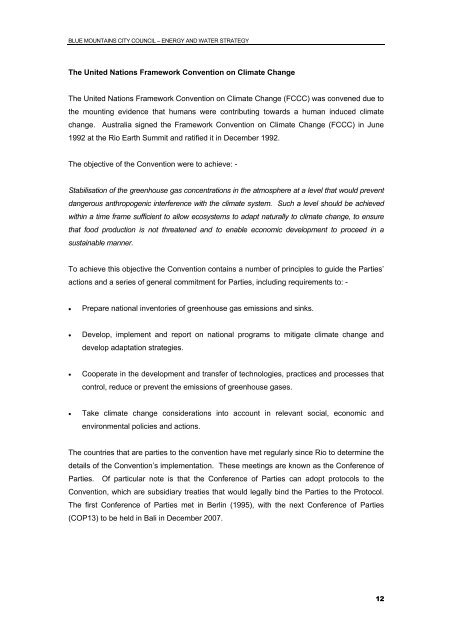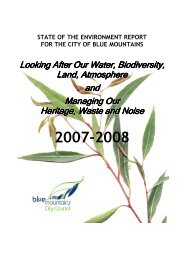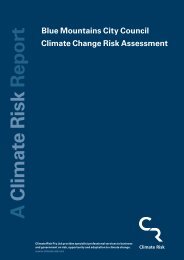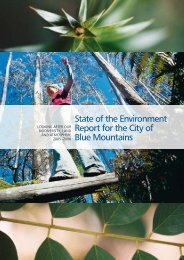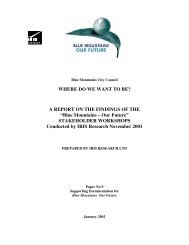Energy and Water Strategy 2007-2010 - Sustainable Blue Mountains
Energy and Water Strategy 2007-2010 - Sustainable Blue Mountains
Energy and Water Strategy 2007-2010 - Sustainable Blue Mountains
Create successful ePaper yourself
Turn your PDF publications into a flip-book with our unique Google optimized e-Paper software.
BLUE MOUNTAINS CITY COUNCIL – ENERGY AND WATER STRATEGY<br />
The United Nations Framework Convention on Climate Change<br />
The United Nations Framework Convention on Climate Change (FCCC) was convened due to<br />
the mounting evidence that humans were contributing towards a human induced climate<br />
change. Australia signed the Framework Convention on Climate Change (FCCC) in June<br />
1992 at the Rio Earth Summit <strong>and</strong> ratified it in December 1992.<br />
The objective of the Convention were to achieve: -<br />
Stabilisation of the greenhouse gas concentrations in the atmosphere at a level that would prevent<br />
dangerous anthropogenic interference with the climate system. Such a level should be achieved<br />
within a time frame sufficient to allow ecosystems to adapt naturally to climate change, to ensure<br />
that food production is not threatened <strong>and</strong> to enable economic development to proceed in a<br />
sustainable manner.<br />
To achieve this objective the Convention contains a number of principles to guide the Parties’<br />
actions <strong>and</strong> a series of general commitment for Parties, including requirements to: -<br />
• Prepare national inventories of greenhouse gas emissions <strong>and</strong> sinks.<br />
• Develop, implement <strong>and</strong> report on national programs to mitigate climate change <strong>and</strong><br />
develop adaptation strategies.<br />
• Cooperate in the development <strong>and</strong> transfer of technologies, practices <strong>and</strong> processes that<br />
control, reduce or prevent the emissions of greenhouse gases.<br />
• Take climate change considerations into account in relevant social, economic <strong>and</strong><br />
environmental policies <strong>and</strong> actions.<br />
The countries that are parties to the convention have met regularly since Rio to determine the<br />
details of the Convention’s implementation. These meetings are known as the Conference of<br />
Parties. Of particular note is that the Conference of Parties can adopt protocols to the<br />
Convention, which are subsidiary treaties that would legally bind the Parties to the Protocol.<br />
The first Conference of Parties met in Berlin (1995), with the next Conference of Parties<br />
(COP13) to be held in Bali in December <strong>2007</strong>.<br />
12


